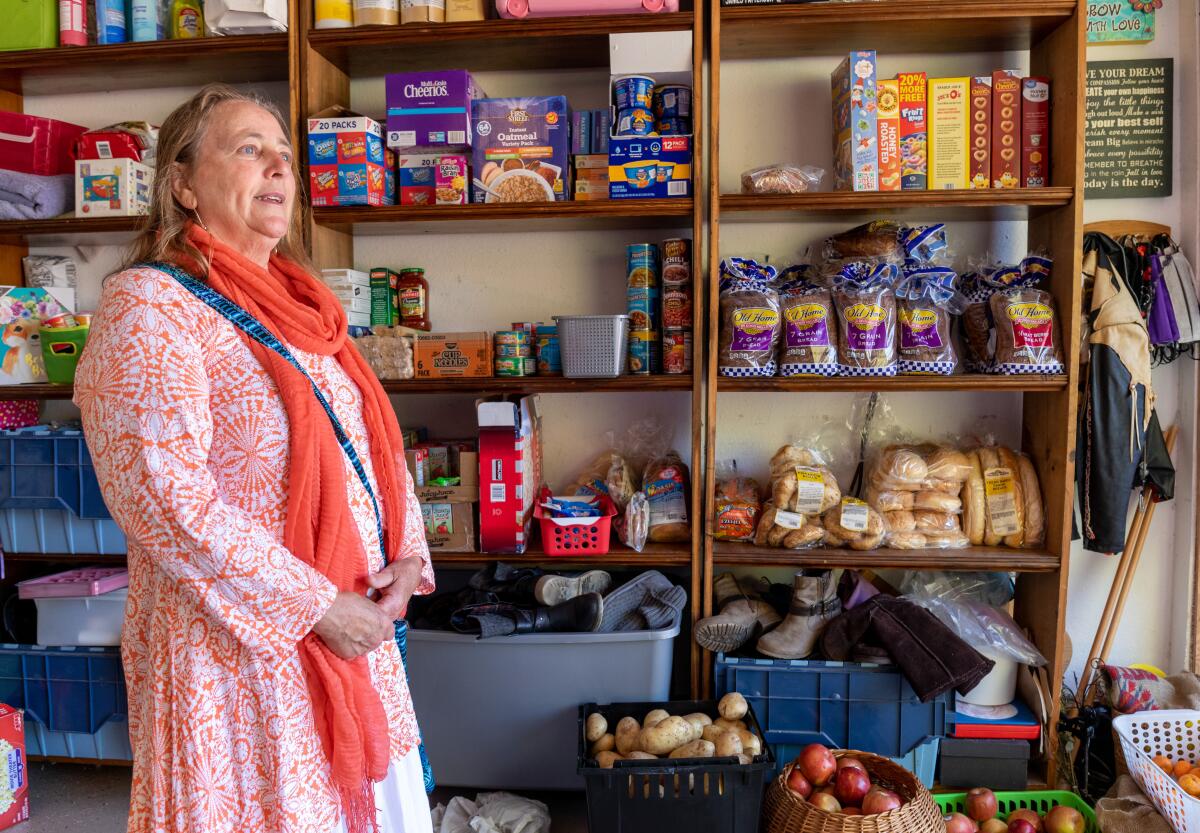Vista shuts down neighborhood pantry that helped feed community

- Share via
VISTA, Calif. — A pantry that provided food, toys, books and a sense of hope for people struggling over the past 14 months during the COVID-19 pandemic has been shut down in Vista because it was operating in a residential neighborhood in apparent violation of a city zoning ordinance.
Angel’s Pantry and Community Cupboard is not going quietly, however.
More than 700 people by Thursday had signed an online change.org petition in support of the pantry opened last year by Mark and Jannah “Angel” Loigman, and seven supporters spoke to Vista City Council members this week, the first in-person council meeting since the shutdown early last year.
“We should be leading with communication rather than citation so we can help sustain this valuable resource for all those who are less fortunate than ourselves,” said Vista resident Dan O’Donnell, a business support manager for a large food company and vice president of the Democratic Club of Vista.
Council members did not respond to the presentation about the pantry because speakers appeared during the public comment portion of the meeting and the matter was not an agenda item open for discussion.
The Loigmans set up the pantry on the driveway of their home in March 2020. At first, it was just a way for Mark to pass along some of the many books he had read.
Sensing that many people in the community were facing growing needs, they added some canned food two days later. Those quickly disappeared, and the couple began leaving pasta and other items by the book shelf.
People learned about the pantry through the Nextdoor app and the Facebook page for Buy Nothing Vista, part of the Buy Nothing Project that promotes sharing as a way of building community.
As word of the pantry grew, food donations started to roll in. Jannah said someone who worked for another food-sharing organization brought items from Lazy Acres, Traders Joe’s and Whole Foods.
But it wasn’t just food. People also dropped off new toys so families in need would have birthday presents for their children. Large stuffed animals were a common sight on a bench at the end of the driveway.
“It was and continues to be beautiful and heartwarming to see those with an abundance in their lives wanting to help members of this community who are less fortunate,” Jannah said this week.
At its peak, the pantry was attracting about 200 people a week, and Jannah estimates they helped 1,000 people over 14 months.
After the city received a complaint from a neighbor, the couple received a letter dated May 21 from a code enforcement officer notifying them they had until June 1 to shut down the pantry because it was creating a health and safety hazard and the property was not zoned for commercial food distribution.
Mark said the letter created some confusion because their pantry was not a commercial operation, but a visit from Assistant City Manager Amanda Lee this week cleared things up.
“At this point, the city’s interpretation of the code is that food pantries of any kind are not allowed in neighborhoods,” he said.
Vista communications officer Andrea McCullough said the city is not against food pantries, but residential neighborhoods are not zoned for food distribution. A pantry could operate in the city’s business park without a permit, and they could be considered an auxiliary use allowed with a special permit at other places. Special permits allow food pantries at Calvary Church on Vista Way, Vista Community Clinic and Guajome Park Academy, she said.
McCullough said the fine for not complying with the order would have been $125 a day, and daily fines could escalate up to $1,000 with continued noncompliance.
Jannah said people have asked why she doesn’t partner with a pantry at another location, but she said she is providing something that others cannot.
“It’s a community,” she said about the neighborhood pantry. “We have conversations. We talk to them. Even as bad as I am with names, I know a lot of them. I kind of know what their children would like. If a special toy would come in, I would hold it for them.”
The pantry provided 650 new toys that had been donated by supporters last Christmas and handed out almost 100 turkeys at Thanksgiving, she said.
“We brought this community together,” Mark told council members at this week’s meeting. “We assisted folks we didn’t know until we met them at our cupboard. And we provided a service that was not available to them anywhere else in this community. We provided this service with dignity, compassion and caring.”
O’Donnell also said the couple provided something that could not be found at large food distributions or bigger pantries.
“When people go there, they find friendship,” he said. “They find mental health resources. They find individuals who share a common bound with them and know that they struggle together and know there is hope at the end of the tunnel.”
After the visit from the assistant city manager, Mark accepted that the pantry would have to close. The food still in the garage would be distributed by June 1 or given to another group, he said.
“We’re going to take some time to reflect on the experience and see what our next step is in trying to serve our community,” Mark said, adding that he is inspired by the support they receive and is remaining optimistic. “Maybe after a break, we’ll find another place.”
Warth writes for the San Diego Union-Tribune.
More to Read
Sign up for Essential California
The most important California stories and recommendations in your inbox every morning.
You may occasionally receive promotional content from the Los Angeles Times.














